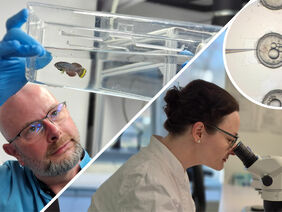Jena, Germany - The Leibniz Institute on Aging (FLI) in Jena is strengthening its expertise in killifish research (Nothobranchius furzeri, also known as the turquoise killifish) and expands its capacities with a new organizational unit. The Experimental and Transgenesis Unit (ETU), with its subunit Fish (ETUF), will now be available not only to internal but also to external scientists, enabling them to conduct and advance research on Nothobranchius furzeri.
The ETUF, supervised by Prof. Dr. Christoph Englert, offers scientists the opportunity to address questions from the molecular to the interorganismal level using genetic modifications, pharmacological, and behavioral tests. The team includes Dr. Annekatrin Richter and Dr. Mario Baumgart, who will cover these areas of responsibility in the future. Both are renowned killifish experts and are looking forward to the new challenge at the institute.
The FLI is a world-wide renowned hub for killifish research, with extensive scientific and technical expertise in the biology of killifish. The turquoise killifish is considered a groundbreaking model organism in aging research, as it recapitulates several aspects of human aging, including immune, brain, and reproductive aging, in vertebrates, and develop interventions that can positively impact the aging process. With the ETUF, the FLI aims to broaden the use of killifish to a wider scientific community, both within and outside the FLI, with the goal of accelerating discoveries in biology of aging.
More than 15 years ago, Nothobranchius furzeri was established as a model organism for aging research at the FLI. Since then, the institute has developed into a worldwide leading center for killifish research, with numerous publications and research projects. These range from the genetics of aging in natural and laboratory populations to the impact of aging on regeneration and organ function and include the generation of genetically modified killifish like the transparent line “klara”, which enables the observation and study of internal organs and life processes in real-time. ETUF will not only benefit from scientific expertise at the FLI but also from the extensive experience regarding killifish husbandry in the state-of-the-art fish facility with experienced and dedicated animal care takers.









